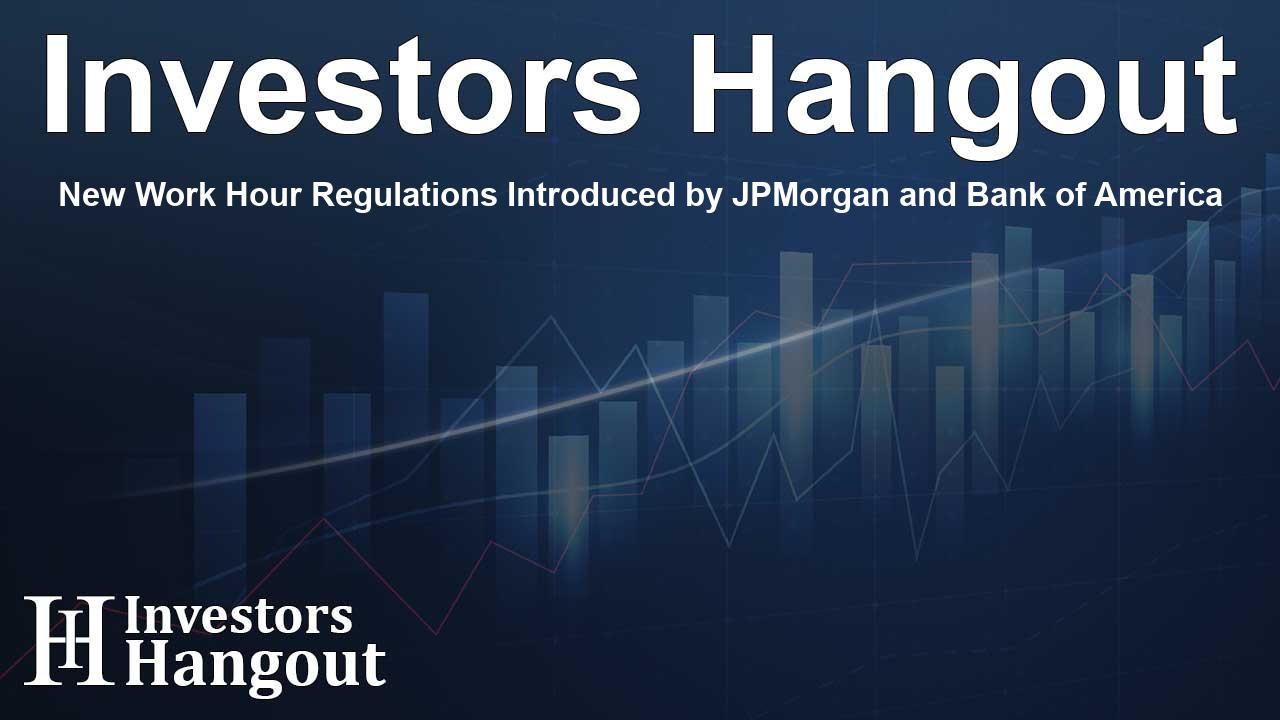New Work Hour Regulations Introduced by JPMorgan and Bank of America

New Measures for Junior Bankers at Major Banks
JPMorgan Chase & Co and Bank of America Corp are stepping up to safeguard the well-being of junior bankers by implementing measures to monitor and limit their work hours.
Understanding the Changes
In response to concerns surrounding a hazardous work culture in investment banking, both institutions are reshaping their work policies. A recent investigation unveiled that many junior bankers at Bank of America were compelled to adjust their work hours artificially to stay within limits.
As part of these reforms, JPMorgan Chase will now enforce an 80-hour weekly cap on the work hours of junior investment bankers, marking a significant shift for the bank. Exceptions are expected for pressing situations, such as those involving live deals.
The Role of New Timekeeping Tools
Bank of America is also responding proactively by launching a new timekeeping system. This tool will require junior bankers to log their hours daily and detail the tasks they perform under different supervisors.
This initiative comes in light of a heartbreaking incident involving a young associate at Bank of America, who tragically passed away after working intense weeks. His experience ignited substantial discussion about employee safety and the responsibility that banks hold within the industry.
Learning from Tragedy
Following the tragic event, JPMorgan's CEO, Jamie Dimon, emphasized the need for examining lessons learned. The revised guidelines aimed at improving work conditions were recently shared with employees. In an effort to strengthen enforcement, Bank of America aims to address previous lapses in adherence to their working hour limits.
Industry Context
The overwork culture is not a new phenomenon across corporate environments. Figures like Elon Musk have frequently discussed the expectation of long hours as a prerequisite for achieving success in various fields. Musk notably stated, "Nobody ever changed the world on 40 hours a week," which further highlights the cultural acceptance of long work hours.
In a similar vein, Jeff Bezos, founder of Amazon.com Inc., has openly rejected the concept of “work-life balance,” describing it as a damaging idea. Instead, he champions “work-life harmony,” implying that in high-pressure settings, a strict separation of work and personal life isn't always feasible.
Contrastingly, figures like Warren Buffett argue that individuals working a standard 40-hour week should be able to lead a comfortable life, highlighting growing concerns about financial inequality and the need for a more equitable structure in employment.
Voices of Experience
Historical industry leaders like the late Steve Jobs, former co-founder of Apple Inc., were also known for demanding intense commitment from their teams. Bill Gates, co-founder of Microsoft Corp, acknowledged that while Jobs inspired many, his rigorous work expectations weren't flawless.
Interestingly, Gates noted, “He would overwork people, so it wasn’t a perfect thing, but Steve was amazing, I learned a lot from him,” reflecting the complex nature of leadership in high-stakes industries.
Next Steps for the Industry
The ripple effects of these new regulations may well set a precedent for others in the financial sector and beyond. As banks like JPMorgan and Bank of America proactively attempt to change the narrative around workload management, there is a possibility that the overall culture within the corporate world may begin to transform.
Frequently Asked Questions
What new regulations are being introduced by JPMorgan and Bank of America?
The banks are implementing an 80-hour weekly work limit for junior bankers and a new timekeeping system for tracking work hours.
Why are these changes significant?
These adjustments aim to address the serious issue of overwork in the banking sector, especially following a tragic incident related to excessive work hours.
How will the new timekeeping tool work?
Junior bankers will be required to log their hours daily and detail their tasks, improving accountability and transparency.
What events triggered this reform?
The policy changes were instigated by the tragic death of a junior banker who had been working excessively long hours.
How might this impact the banking industry?
These reforms could set a new standard for workload management and employee well-being, potentially influencing other sectors to evaluate their practices.
About The Author
Contact Lucas Young privately here. Or send an email with ATTN: Lucas Young as the subject to contact@investorshangout.com.
About Investors Hangout
Investors Hangout is a leading online stock forum for financial discussion and learning, offering a wide range of free tools and resources. It draws in traders of all levels, who exchange market knowledge, investigate trading tactics, and keep an eye on industry developments in real time. Featuring financial articles, stock message boards, quotes, charts, company profiles, and live news updates. Through cooperative learning and a wealth of informational resources, it helps users from novices creating their first portfolios to experts honing their techniques. Join Investors Hangout today: https://investorshangout.com/
The content of this article is based on factual, publicly available information and does not represent legal, financial, or investment advice. Investors Hangout does not offer financial advice, and the author is not a licensed financial advisor. Consult a qualified advisor before making any financial or investment decisions based on this article. This article should not be considered advice to purchase, sell, or hold any securities or other investments. If any of the material provided here is inaccurate, please contact us for corrections.
